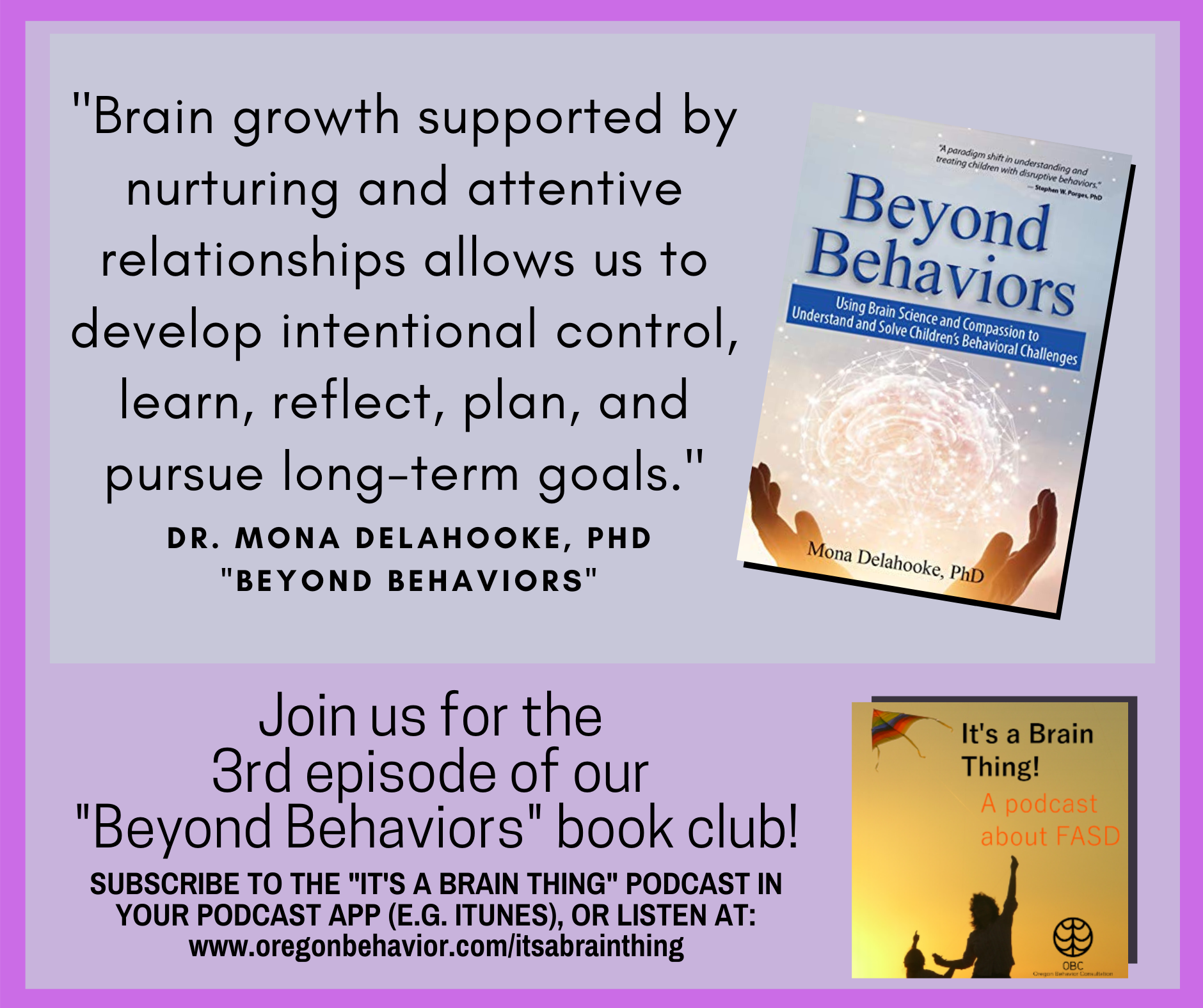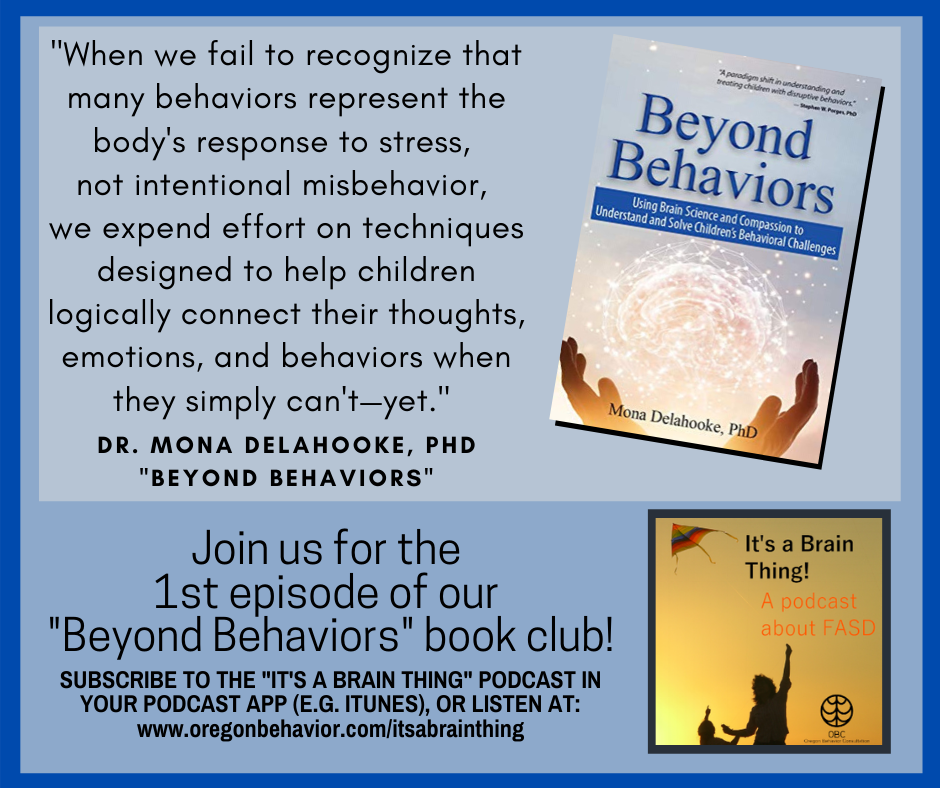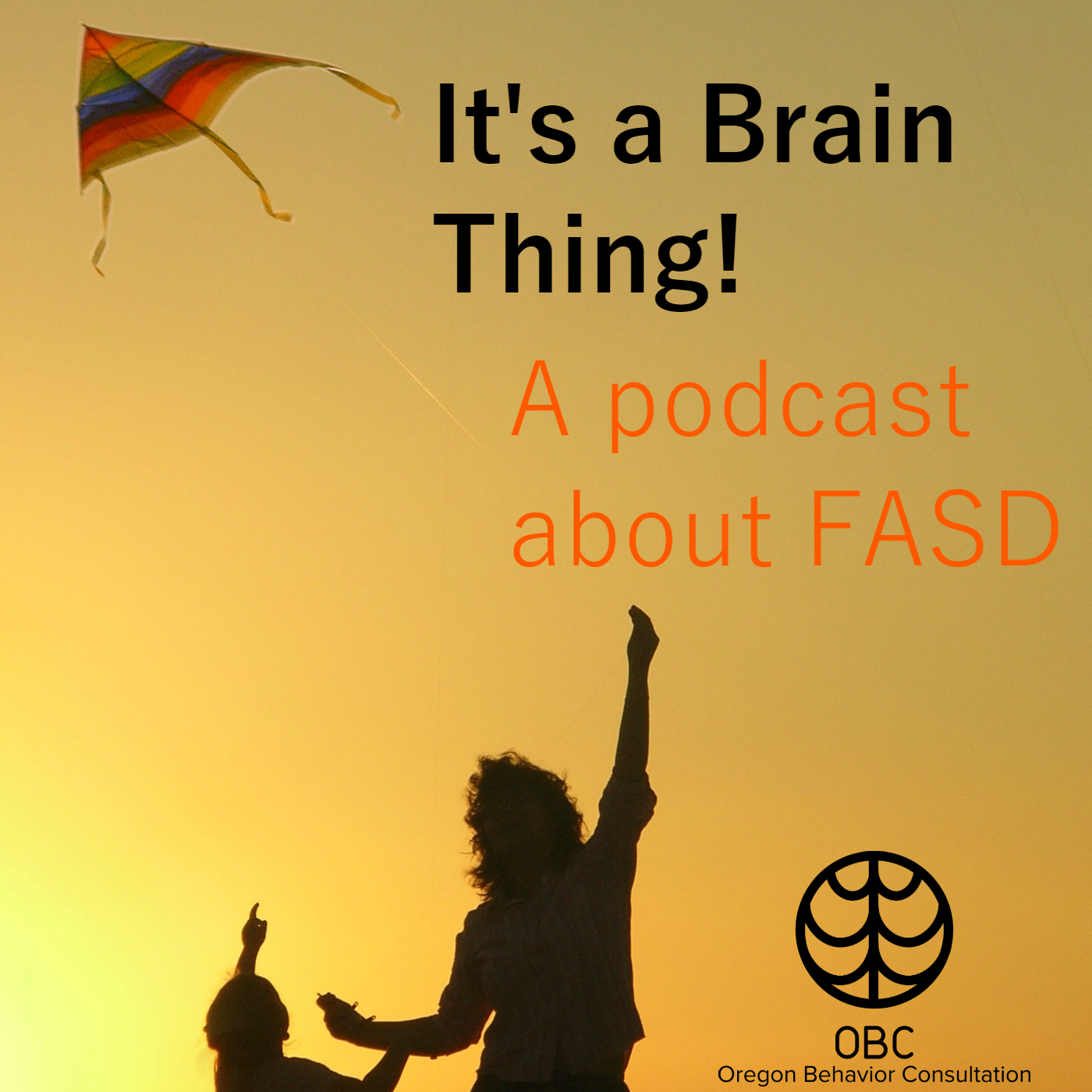In this episode, we go through Chapter 5 of Dr. Mona Delahooke's "Beyond Behaviors." We cover early dysregulation issues that appear to resolve (but don't), difficulties with sleep, and understanding the specifics of our children's sensory systems. With this knowledge, we can continue to help their brains feel safe, putting them in a place to connect and learn.
In this episode, we go through Chapter 4of “Beyond Behaviors”, understanding that a child’s safety must be the adult’s priority if we are to effectively address challenging behaviors. In addition to thinking about how our child responds when under stress, we must also look at how our own bodies and brains respond when triggered, leading us to build our own set of coping skills. Once we can do this, we can begin the process of co-emotional regulation.
In this episode, Dr. Delahooke takes us through the sensory processing system how it links to trauma and dysregulation. Make sure to fill out the included sensory sheets!
In this episode, Nate finishes up Chapter 2 by going through the three different polyvagal Pathways: Green (ventral vagal), Red (sympathetic). and Blue (dorsal vagal).
These pathways are important to understand so we can identify which type of dysregulation our child may be going through, allowing us to explore better proactive and reactive responses. You can find worksheets with additional information in the book!
In this episode, we go through the first part of Chapter 2, which talks about developmental processes. This is extremely relevant to FASD, and gives us insights into 1) why kids may not have fully developed early processes and 2) why traditional or punishment-based responses do not work.
Please buy “Beyond Behaviors” at online book retailers if you haven’t done so! You can support Nate’s work on Patreon: www.patreon.com/cognitivesupports
In this episode, Nate takes you through his thoughts on the introduction and chapter one of Dr. Delahook's book, "Beyond Behaviors".
We will talk about why Dr. Delahook believes common and punitive-based responses to behaviors aren't helpful for children with sensitive nervous systems or histories of trauma. She also introduces us to Polyvagal Theory, which is the basis for the current direction trauma-informed practice is moving.
Make sure to order “Beyond Behaviors” by Dr. Mona Delahooke, PhD. for our upcoming book club. Our next episode will feature Chapter 1!
Dr. Indre Viskontas, PhD – https://www.indreviskontas.com
Cadence (Indre’s podcast about music and the brain) - https://www.indreviskontas.com/potowski-av
Inquiring Minds (I love this podcast!!!) - https://inquiring.show
Great Courses: Brain Myths Exploded by Dr. Indre Viskontas - https://www.thegreatcourses.com/courses/brain-myths-exploded-lessons-from-neuroscience.html
Great Courses: 12 Essential Scientific Concepts - https://www.thegreatcourses.com/courses/12-essential-scientific-concepts.html
Matt Walker “Why We Sleep” – https://www.amazon.com/Why-We-Sleep-Unlocking-Dreams/dp/1501144324/ref=tmm_pap_swatch_0?_encoding=UTF8&qid=1586723800&sr=8-2
Make sure to order “Beyond Behaviors” by Dr. Mona Delahooke, PhD. for our upcoming book club. Our next episode will feature Chapter 1!
Dr. Indre Viskontas, PhD – https://www.indreviskontas.com
Cadence (Indre’s podcast about music and the brain) - https://www.indreviskontas.com/potowski-av
Inquiring Minds (I love this podcast!!!) - https://inquiring.show
Great Courses: Brain Myths Exploded by Dr. Indre Viskontas - https://www.thegreatcourses.com/courses/brain-myths-exploded-lessons-from-neuroscience.html
Great Courses: 12 Essential Scientific Concepts - https://www.thegreatcourses.com/courses/12-essential-scientific-concepts.html
Matt Walker “Why We Sleep” – https://www.amazon.com/Why-We-Sleep-Unlocking-Dreams/dp/1501144324/ref=tmm_pap_swatch_0?_encoding=UTF8&qid=1586723800&sr=8-2
Nate wants to check in with you all! We’ll talk about the podcast, Nate’s life, Nate’s upcoming book, and a book club that we will be starting for a different book!
Make sure to order Dr. Mona Delahook’s book “Beyond Behaviors: : Using Brain Science and Compassion to Understand and Solve Children's Behavioral Challenges” for our upcoming book club!
https://www.amazon.com/Beyond-Behaviors-Compassion-Understand-Behavioral/dp/1683731190
Nate will be back soon with a normal podcast!
In this episode, Nate and Jill talk about the end of summer, transitioning back to school, and strategies for managing extracurricular activities, plus updates about the new episode format, and some big news from Jill!
After a brief hiatus due to major busy times, we're back! In this episode, Nate and Jill are joined by Nate's sister to talk about squabbling siblings, adjusting to summer, and the projects they're working on.
Do you enjoy our podcasts? We want to keep providing them (and our videos!) to people all over the world free of charge. Please consider supporting us for as little as $2 per month on www.patreon.com/OregonBehavior.
Links:
Building Up! Intensive Workshop: http://www.oregonbehavior.com/buildingup
House of Huckleberry: https://www.houseofhuckleberry.com/
In this episode, we talk about perseveration, a common behavior in FASD and other developmental disabilities. Why do some people perseverate, and how do we need to re-frame the behaviors so we can respond in a way that doesn't create more stress?
Do you enjoy our podcasts? We want to keep providing them (and our videos!) to people all over the world free of charge. Please consider supporting us for as little as $2 per month on www.patreon.com/OregonBehavior.
NIH news release about their FASD study: https://www.nih.gov/news-events/news-releases/study-first-graders-shows-fetal-alcohol-spectrum-disorders-prevalent-us-communities
Great Youtube video about "echolalia": https://youtu.be/ome-95iHtB0
How do you deal with it when the person you support lies? Well, first you should determine whether or not that's what they're actually doing. And (spoiler alert!) often what looks like lying may be something else entirely. In this episode, Nate and Jill discuss different possible explanations for a kid saying something that's not true, and best practices for addressing it.
Links:
https://www.youtube.com/watch?v=UJI8XN5EEC4
https://www.patreon.com/OregonBehavior
http://www.houseofhuckleberry.com
In this episode, Nate and Jill talk about how we can view challenging behaviors through a cognitive skill lens. Also the introduction of a new segment in which we define and talk about basic terms you probably already know, but maybe not as well as you'd like!
The OBC Cognitive Skills List: http://www.oregonbehavior.com/s/OBC-Skills-List.pdf
Patreon: https://www.patreon.com/OregonBehavior
There are many things to think about when working with kids on social skills and friendships. In this episode, we touch on some important things to consider as we attempt to teach our kids to have safe and healthy relationships.
Links: www.meetup.com
In this episode, we answer our listeners' questions about various issues related to FASD! Keep them coming! Visit www.tinyurl.com/listenerquestions to ask!
It's a Brain Thing
A Podcast About FASD
In this episode, we touch on the basics of empathy. What is it, and how can we work on it with kids, teenagers, and adults with FASDs? Let us know your thoughts by leaving a message on the Oregon Behavior Consultation Facebook page!
We will be doing a listener question podcast where we answer your burning questions! Ask about FASD, behaviors, planning for the future, or any other question you think Nate and Jill can help you with! Fill out the form below to ask a question! Please do not use last names of children or people with behaviors you are asking about. (We may edit certain questions and change names to make them "on-air" friendly.)
Talking about behaviors can be difficult, especially if the person you are talking to struggles with abstract thinking or communication. In this episode, we provide you with a visual (download the PDF file below!) that may be helpful in working through behaviors with the person you're supporting.
You can download the visual for free here!
Hi everyone! When the podcast changed names we lost this interivew, and so we wanted to re-air it to make sure everyone can listen! In this interview, we discuss what it is like to have FASD with RJ Formanek. He talks to us about growing up, how his brain works, and how those of us caring for a person with FASD can help.
FASD: Flying with Broken Wings (Facebook group)
Red Shoes Rock (Facebook group)
Please consider supporting us for as low as $1 per month on our Patreon page.




